International Monetary Fund and Global Hegemonic Influence
VerifiedAdded on 2021/10/08
|9
|2513
|75
Report
AI Summary
This report examines the International Monetary Fund (IMF) and its role in global hegemony, exploring the relationship between the IMF and global economic stability. It delves into the concept of hegemony, various theories of power, and the IMF's promotion of neoliberal policies. The report discusses the IMF's functions, including surveillance, lending, and technical assistance, and analyzes its impact on developing countries. It also considers the influence of US hegemony on the IMF's policies and the resulting power dynamics within the global economic system. The report highlights the IMF's contributions to economic stability and its involvement in governance issues, while also acknowledging criticisms regarding its structural adjustment programs and their potential effects on political stability and democracy. The analysis incorporates various approaches to hegemony, including conventional, neoliberal, Gramscian, and radical perspectives, to provide a comprehensive understanding of the IMF's influence on the global economic landscape.
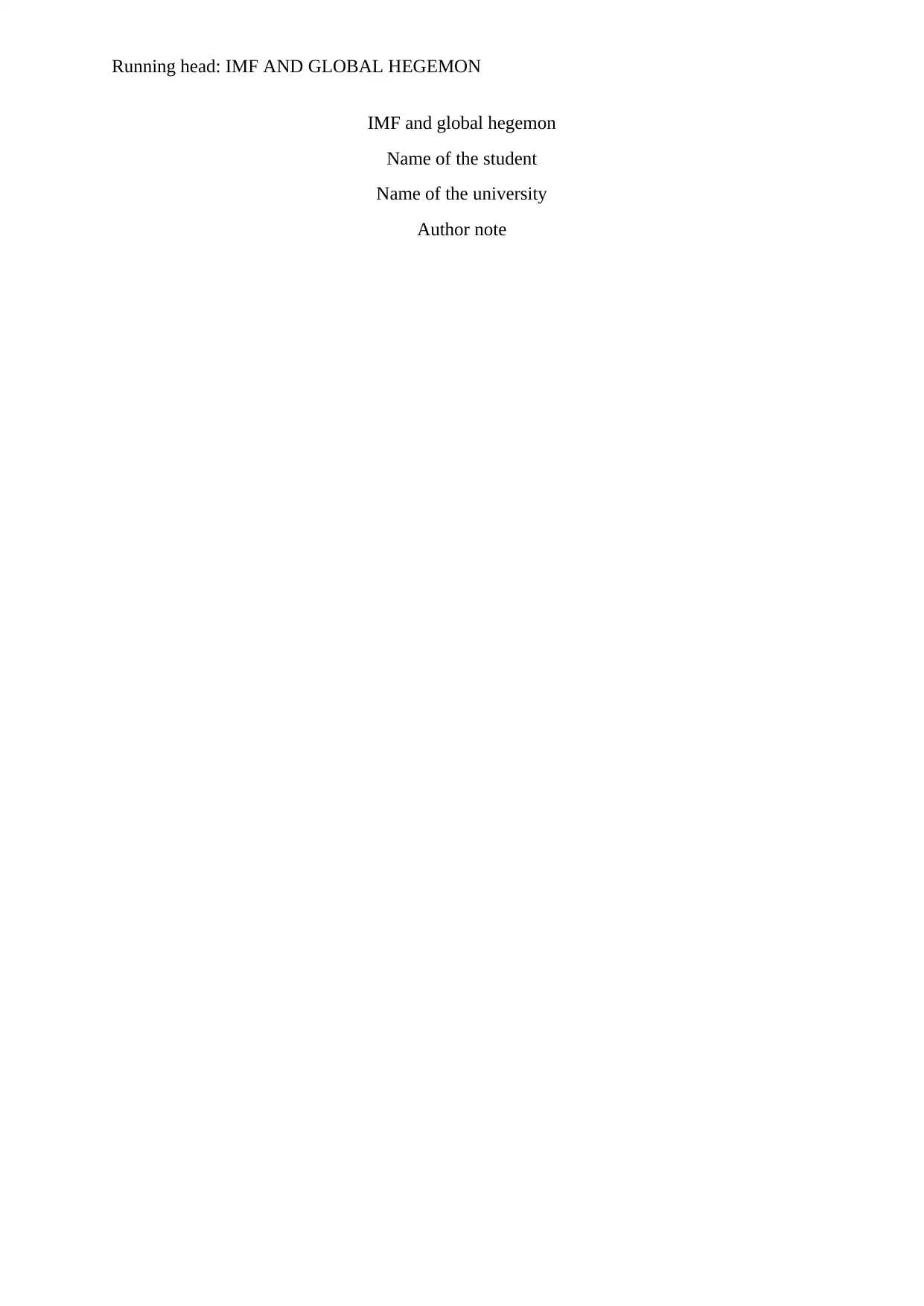
Running head: IMF AND GLOBAL HEGEMON
IMF and global hegemon
Name of the student
Name of the university
Author note
IMF and global hegemon
Name of the student
Name of the university
Author note
Paraphrase This Document
Need a fresh take? Get an instant paraphrase of this document with our AI Paraphraser
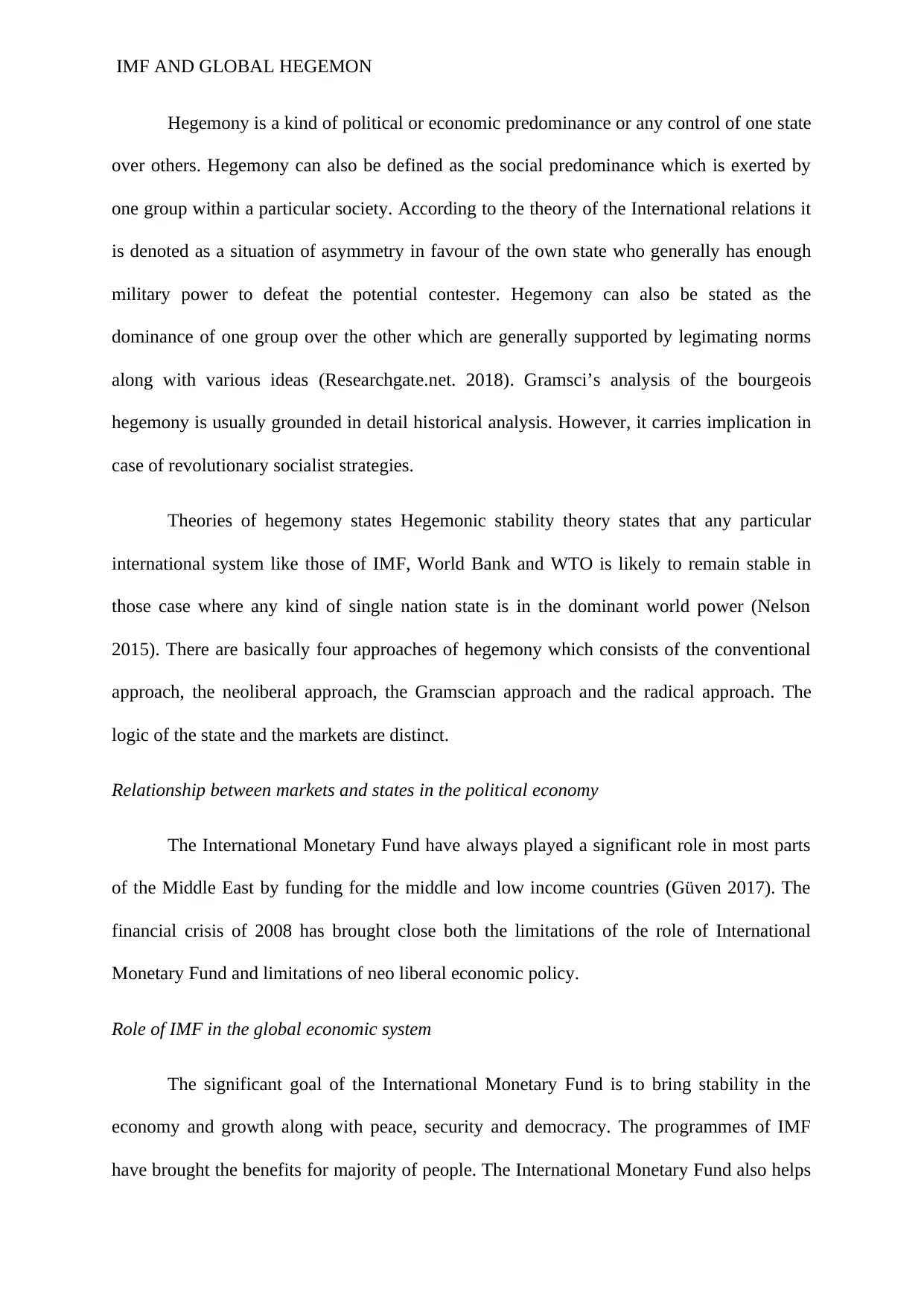
IMF AND GLOBAL HEGEMON
Hegemony is a kind of political or economic predominance or any control of one state
over others. Hegemony can also be defined as the social predominance which is exerted by
one group within a particular society. According to the theory of the International relations it
is denoted as a situation of asymmetry in favour of the own state who generally has enough
military power to defeat the potential contester. Hegemony can also be stated as the
dominance of one group over the other which are generally supported by legimating norms
along with various ideas (Researchgate.net. 2018). Gramsci’s analysis of the bourgeois
hegemony is usually grounded in detail historical analysis. However, it carries implication in
case of revolutionary socialist strategies.
Theories of hegemony states Hegemonic stability theory states that any particular
international system like those of IMF, World Bank and WTO is likely to remain stable in
those case where any kind of single nation state is in the dominant world power (Nelson
2015). There are basically four approaches of hegemony which consists of the conventional
approach, the neoliberal approach, the Gramscian approach and the radical approach. The
logic of the state and the markets are distinct.
Relationship between markets and states in the political economy
The International Monetary Fund have always played a significant role in most parts
of the Middle East by funding for the middle and low income countries (Güven 2017). The
financial crisis of 2008 has brought close both the limitations of the role of International
Monetary Fund and limitations of neo liberal economic policy.
Role of IMF in the global economic system
The significant goal of the International Monetary Fund is to bring stability in the
economy and growth along with peace, security and democracy. The programmes of IMF
have brought the benefits for majority of people. The International Monetary Fund also helps
Hegemony is a kind of political or economic predominance or any control of one state
over others. Hegemony can also be defined as the social predominance which is exerted by
one group within a particular society. According to the theory of the International relations it
is denoted as a situation of asymmetry in favour of the own state who generally has enough
military power to defeat the potential contester. Hegemony can also be stated as the
dominance of one group over the other which are generally supported by legimating norms
along with various ideas (Researchgate.net. 2018). Gramsci’s analysis of the bourgeois
hegemony is usually grounded in detail historical analysis. However, it carries implication in
case of revolutionary socialist strategies.
Theories of hegemony states Hegemonic stability theory states that any particular
international system like those of IMF, World Bank and WTO is likely to remain stable in
those case where any kind of single nation state is in the dominant world power (Nelson
2015). There are basically four approaches of hegemony which consists of the conventional
approach, the neoliberal approach, the Gramscian approach and the radical approach. The
logic of the state and the markets are distinct.
Relationship between markets and states in the political economy
The International Monetary Fund have always played a significant role in most parts
of the Middle East by funding for the middle and low income countries (Güven 2017). The
financial crisis of 2008 has brought close both the limitations of the role of International
Monetary Fund and limitations of neo liberal economic policy.
Role of IMF in the global economic system
The significant goal of the International Monetary Fund is to bring stability in the
economy and growth along with peace, security and democracy. The programmes of IMF
have brought the benefits for majority of people. The International Monetary Fund also helps
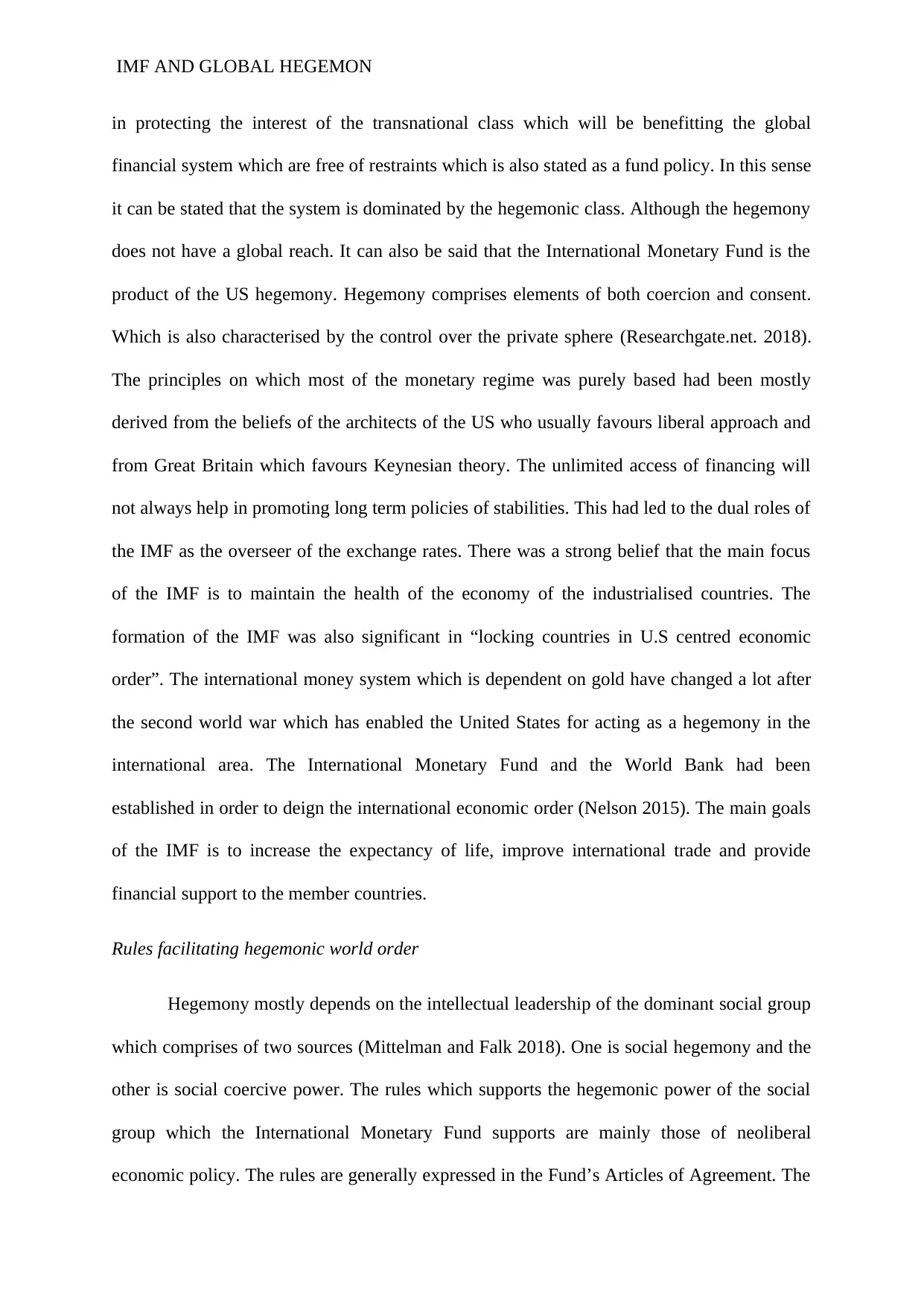
IMF AND GLOBAL HEGEMON
in protecting the interest of the transnational class which will be benefitting the global
financial system which are free of restraints which is also stated as a fund policy. In this sense
it can be stated that the system is dominated by the hegemonic class. Although the hegemony
does not have a global reach. It can also be said that the International Monetary Fund is the
product of the US hegemony. Hegemony comprises elements of both coercion and consent.
Which is also characterised by the control over the private sphere (Researchgate.net. 2018).
The principles on which most of the monetary regime was purely based had been mostly
derived from the beliefs of the architects of the US who usually favours liberal approach and
from Great Britain which favours Keynesian theory. The unlimited access of financing will
not always help in promoting long term policies of stabilities. This had led to the dual roles of
the IMF as the overseer of the exchange rates. There was a strong belief that the main focus
of the IMF is to maintain the health of the economy of the industrialised countries. The
formation of the IMF was also significant in “locking countries in U.S centred economic
order”. The international money system which is dependent on gold have changed a lot after
the second world war which has enabled the United States for acting as a hegemony in the
international area. The International Monetary Fund and the World Bank had been
established in order to deign the international economic order (Nelson 2015). The main goals
of the IMF is to increase the expectancy of life, improve international trade and provide
financial support to the member countries.
Rules facilitating hegemonic world order
Hegemony mostly depends on the intellectual leadership of the dominant social group
which comprises of two sources (Mittelman and Falk 2018). One is social hegemony and the
other is social coercive power. The rules which supports the hegemonic power of the social
group which the International Monetary Fund supports are mainly those of neoliberal
economic policy. The rules are generally expressed in the Fund’s Articles of Agreement. The
in protecting the interest of the transnational class which will be benefitting the global
financial system which are free of restraints which is also stated as a fund policy. In this sense
it can be stated that the system is dominated by the hegemonic class. Although the hegemony
does not have a global reach. It can also be said that the International Monetary Fund is the
product of the US hegemony. Hegemony comprises elements of both coercion and consent.
Which is also characterised by the control over the private sphere (Researchgate.net. 2018).
The principles on which most of the monetary regime was purely based had been mostly
derived from the beliefs of the architects of the US who usually favours liberal approach and
from Great Britain which favours Keynesian theory. The unlimited access of financing will
not always help in promoting long term policies of stabilities. This had led to the dual roles of
the IMF as the overseer of the exchange rates. There was a strong belief that the main focus
of the IMF is to maintain the health of the economy of the industrialised countries. The
formation of the IMF was also significant in “locking countries in U.S centred economic
order”. The international money system which is dependent on gold have changed a lot after
the second world war which has enabled the United States for acting as a hegemony in the
international area. The International Monetary Fund and the World Bank had been
established in order to deign the international economic order (Nelson 2015). The main goals
of the IMF is to increase the expectancy of life, improve international trade and provide
financial support to the member countries.
Rules facilitating hegemonic world order
Hegemony mostly depends on the intellectual leadership of the dominant social group
which comprises of two sources (Mittelman and Falk 2018). One is social hegemony and the
other is social coercive power. The rules which supports the hegemonic power of the social
group which the International Monetary Fund supports are mainly those of neoliberal
economic policy. The rules are generally expressed in the Fund’s Articles of Agreement. The
⊘ This is a preview!⊘
Do you want full access?
Subscribe today to unlock all pages.

Trusted by 1+ million students worldwide
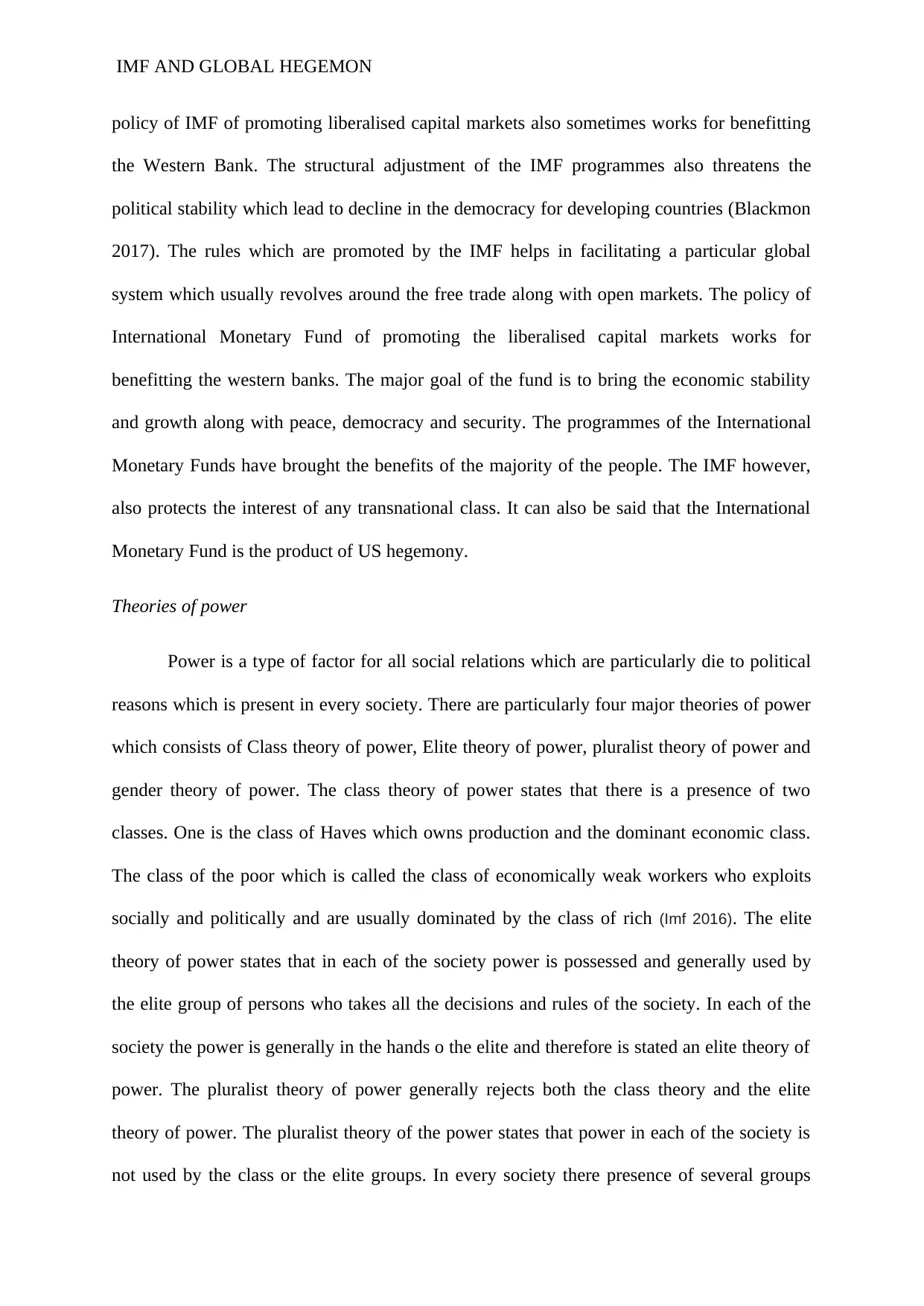
IMF AND GLOBAL HEGEMON
policy of IMF of promoting liberalised capital markets also sometimes works for benefitting
the Western Bank. The structural adjustment of the IMF programmes also threatens the
political stability which lead to decline in the democracy for developing countries (Blackmon
2017). The rules which are promoted by the IMF helps in facilitating a particular global
system which usually revolves around the free trade along with open markets. The policy of
International Monetary Fund of promoting the liberalised capital markets works for
benefitting the western banks. The major goal of the fund is to bring the economic stability
and growth along with peace, democracy and security. The programmes of the International
Monetary Funds have brought the benefits of the majority of the people. The IMF however,
also protects the interest of any transnational class. It can also be said that the International
Monetary Fund is the product of US hegemony.
Theories of power
Power is a type of factor for all social relations which are particularly die to political
reasons which is present in every society. There are particularly four major theories of power
which consists of Class theory of power, Elite theory of power, pluralist theory of power and
gender theory of power. The class theory of power states that there is a presence of two
classes. One is the class of Haves which owns production and the dominant economic class.
The class of the poor which is called the class of economically weak workers who exploits
socially and politically and are usually dominated by the class of rich (Imf 2016). The elite
theory of power states that in each of the society power is possessed and generally used by
the elite group of persons who takes all the decisions and rules of the society. In each of the
society the power is generally in the hands o the elite and therefore is stated an elite theory of
power. The pluralist theory of power generally rejects both the class theory and the elite
theory of power. The pluralist theory of the power states that power in each of the society is
not used by the class or the elite groups. In every society there presence of several groups
policy of IMF of promoting liberalised capital markets also sometimes works for benefitting
the Western Bank. The structural adjustment of the IMF programmes also threatens the
political stability which lead to decline in the democracy for developing countries (Blackmon
2017). The rules which are promoted by the IMF helps in facilitating a particular global
system which usually revolves around the free trade along with open markets. The policy of
International Monetary Fund of promoting the liberalised capital markets works for
benefitting the western banks. The major goal of the fund is to bring the economic stability
and growth along with peace, democracy and security. The programmes of the International
Monetary Funds have brought the benefits of the majority of the people. The IMF however,
also protects the interest of any transnational class. It can also be said that the International
Monetary Fund is the product of US hegemony.
Theories of power
Power is a type of factor for all social relations which are particularly die to political
reasons which is present in every society. There are particularly four major theories of power
which consists of Class theory of power, Elite theory of power, pluralist theory of power and
gender theory of power. The class theory of power states that there is a presence of two
classes. One is the class of Haves which owns production and the dominant economic class.
The class of the poor which is called the class of economically weak workers who exploits
socially and politically and are usually dominated by the class of rich (Imf 2016). The elite
theory of power states that in each of the society power is possessed and generally used by
the elite group of persons who takes all the decisions and rules of the society. In each of the
society the power is generally in the hands o the elite and therefore is stated an elite theory of
power. The pluralist theory of power generally rejects both the class theory and the elite
theory of power. The pluralist theory of the power states that power in each of the society is
not used by the class or the elite groups. In every society there presence of several groups
Paraphrase This Document
Need a fresh take? Get an instant paraphrase of this document with our AI Paraphraser
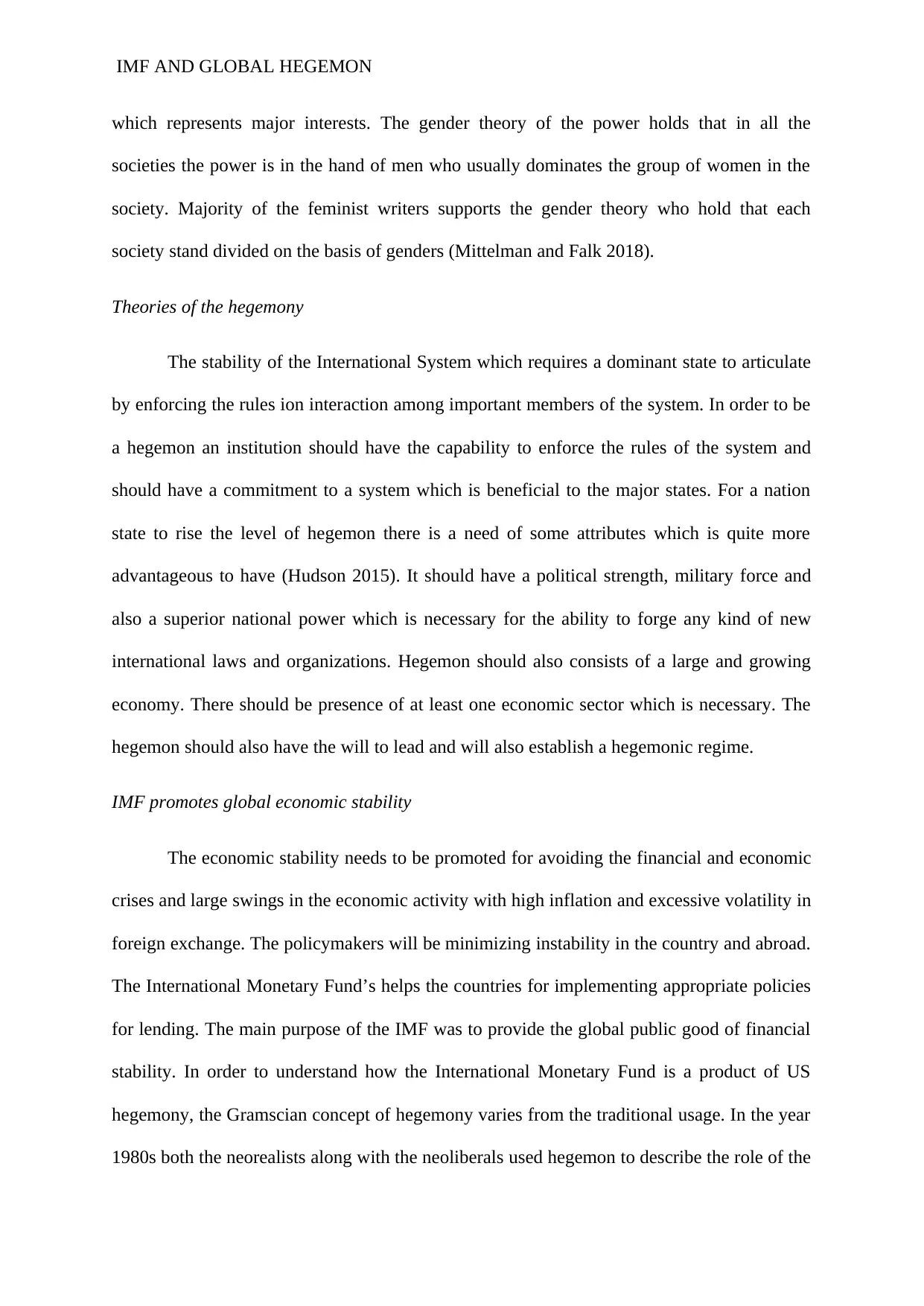
IMF AND GLOBAL HEGEMON
which represents major interests. The gender theory of the power holds that in all the
societies the power is in the hand of men who usually dominates the group of women in the
society. Majority of the feminist writers supports the gender theory who hold that each
society stand divided on the basis of genders (Mittelman and Falk 2018).
Theories of the hegemony
The stability of the International System which requires a dominant state to articulate
by enforcing the rules ion interaction among important members of the system. In order to be
a hegemon an institution should have the capability to enforce the rules of the system and
should have a commitment to a system which is beneficial to the major states. For a nation
state to rise the level of hegemon there is a need of some attributes which is quite more
advantageous to have (Hudson 2015). It should have a political strength, military force and
also a superior national power which is necessary for the ability to forge any kind of new
international laws and organizations. Hegemon should also consists of a large and growing
economy. There should be presence of at least one economic sector which is necessary. The
hegemon should also have the will to lead and will also establish a hegemonic regime.
IMF promotes global economic stability
The economic stability needs to be promoted for avoiding the financial and economic
crises and large swings in the economic activity with high inflation and excessive volatility in
foreign exchange. The policymakers will be minimizing instability in the country and abroad.
The International Monetary Fund’s helps the countries for implementing appropriate policies
for lending. The main purpose of the IMF was to provide the global public good of financial
stability. In order to understand how the International Monetary Fund is a product of US
hegemony, the Gramscian concept of hegemony varies from the traditional usage. In the year
1980s both the neorealists along with the neoliberals used hegemon to describe the role of the
which represents major interests. The gender theory of the power holds that in all the
societies the power is in the hand of men who usually dominates the group of women in the
society. Majority of the feminist writers supports the gender theory who hold that each
society stand divided on the basis of genders (Mittelman and Falk 2018).
Theories of the hegemony
The stability of the International System which requires a dominant state to articulate
by enforcing the rules ion interaction among important members of the system. In order to be
a hegemon an institution should have the capability to enforce the rules of the system and
should have a commitment to a system which is beneficial to the major states. For a nation
state to rise the level of hegemon there is a need of some attributes which is quite more
advantageous to have (Hudson 2015). It should have a political strength, military force and
also a superior national power which is necessary for the ability to forge any kind of new
international laws and organizations. Hegemon should also consists of a large and growing
economy. There should be presence of at least one economic sector which is necessary. The
hegemon should also have the will to lead and will also establish a hegemonic regime.
IMF promotes global economic stability
The economic stability needs to be promoted for avoiding the financial and economic
crises and large swings in the economic activity with high inflation and excessive volatility in
foreign exchange. The policymakers will be minimizing instability in the country and abroad.
The International Monetary Fund’s helps the countries for implementing appropriate policies
for lending. The main purpose of the IMF was to provide the global public good of financial
stability. In order to understand how the International Monetary Fund is a product of US
hegemony, the Gramscian concept of hegemony varies from the traditional usage. In the year
1980s both the neorealists along with the neoliberals used hegemon to describe the role of the
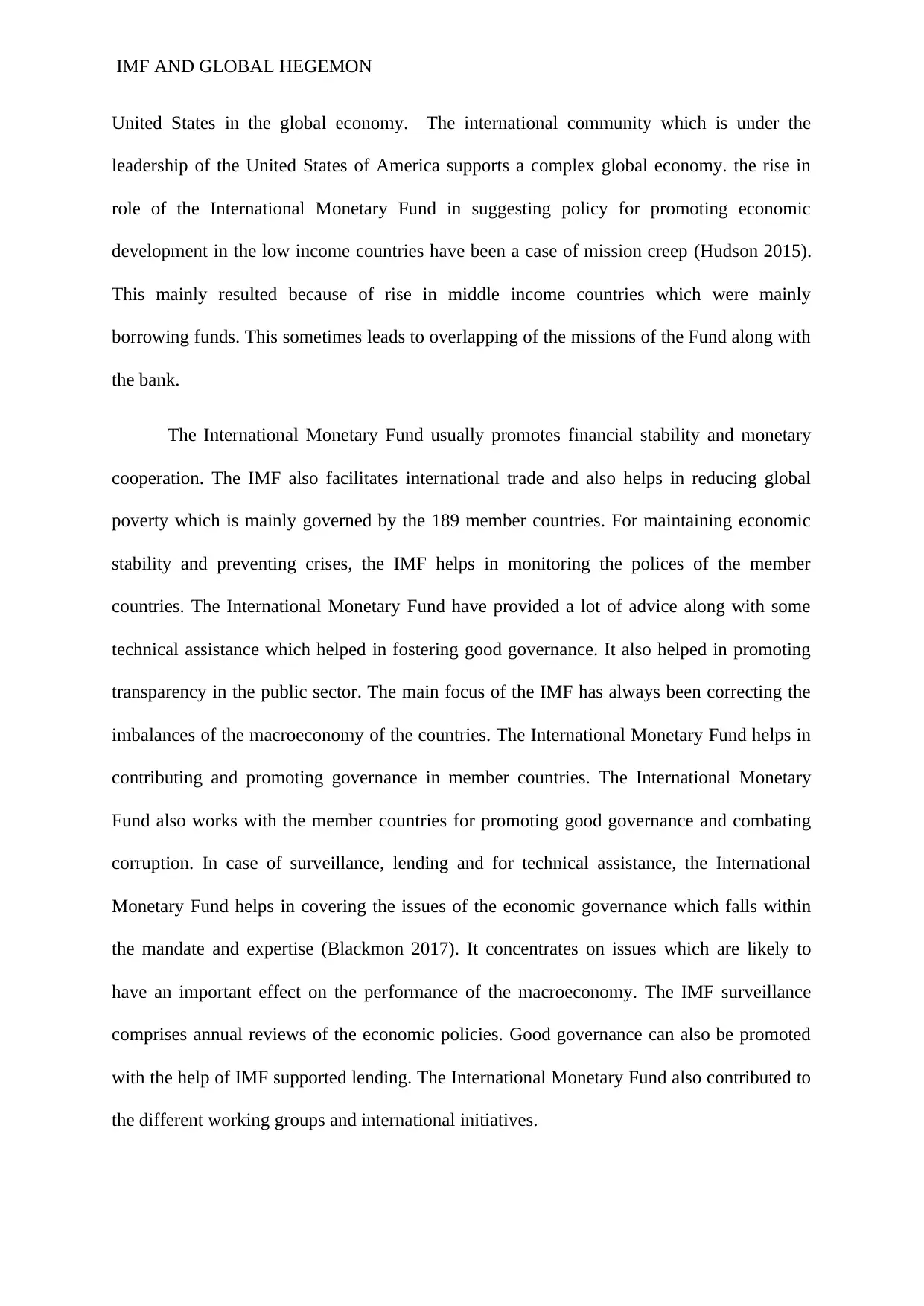
IMF AND GLOBAL HEGEMON
United States in the global economy. The international community which is under the
leadership of the United States of America supports a complex global economy. the rise in
role of the International Monetary Fund in suggesting policy for promoting economic
development in the low income countries have been a case of mission creep (Hudson 2015).
This mainly resulted because of rise in middle income countries which were mainly
borrowing funds. This sometimes leads to overlapping of the missions of the Fund along with
the bank.
The International Monetary Fund usually promotes financial stability and monetary
cooperation. The IMF also facilitates international trade and also helps in reducing global
poverty which is mainly governed by the 189 member countries. For maintaining economic
stability and preventing crises, the IMF helps in monitoring the polices of the member
countries. The International Monetary Fund have provided a lot of advice along with some
technical assistance which helped in fostering good governance. It also helped in promoting
transparency in the public sector. The main focus of the IMF has always been correcting the
imbalances of the macroeconomy of the countries. The International Monetary Fund helps in
contributing and promoting governance in member countries. The International Monetary
Fund also works with the member countries for promoting good governance and combating
corruption. In case of surveillance, lending and for technical assistance, the International
Monetary Fund helps in covering the issues of the economic governance which falls within
the mandate and expertise (Blackmon 2017). It concentrates on issues which are likely to
have an important effect on the performance of the macroeconomy. The IMF surveillance
comprises annual reviews of the economic policies. Good governance can also be promoted
with the help of IMF supported lending. The International Monetary Fund also contributed to
the different working groups and international initiatives.
United States in the global economy. The international community which is under the
leadership of the United States of America supports a complex global economy. the rise in
role of the International Monetary Fund in suggesting policy for promoting economic
development in the low income countries have been a case of mission creep (Hudson 2015).
This mainly resulted because of rise in middle income countries which were mainly
borrowing funds. This sometimes leads to overlapping of the missions of the Fund along with
the bank.
The International Monetary Fund usually promotes financial stability and monetary
cooperation. The IMF also facilitates international trade and also helps in reducing global
poverty which is mainly governed by the 189 member countries. For maintaining economic
stability and preventing crises, the IMF helps in monitoring the polices of the member
countries. The International Monetary Fund have provided a lot of advice along with some
technical assistance which helped in fostering good governance. It also helped in promoting
transparency in the public sector. The main focus of the IMF has always been correcting the
imbalances of the macroeconomy of the countries. The International Monetary Fund helps in
contributing and promoting governance in member countries. The International Monetary
Fund also works with the member countries for promoting good governance and combating
corruption. In case of surveillance, lending and for technical assistance, the International
Monetary Fund helps in covering the issues of the economic governance which falls within
the mandate and expertise (Blackmon 2017). It concentrates on issues which are likely to
have an important effect on the performance of the macroeconomy. The IMF surveillance
comprises annual reviews of the economic policies. Good governance can also be promoted
with the help of IMF supported lending. The International Monetary Fund also contributed to
the different working groups and international initiatives.
⊘ This is a preview!⊘
Do you want full access?
Subscribe today to unlock all pages.

Trusted by 1+ million students worldwide
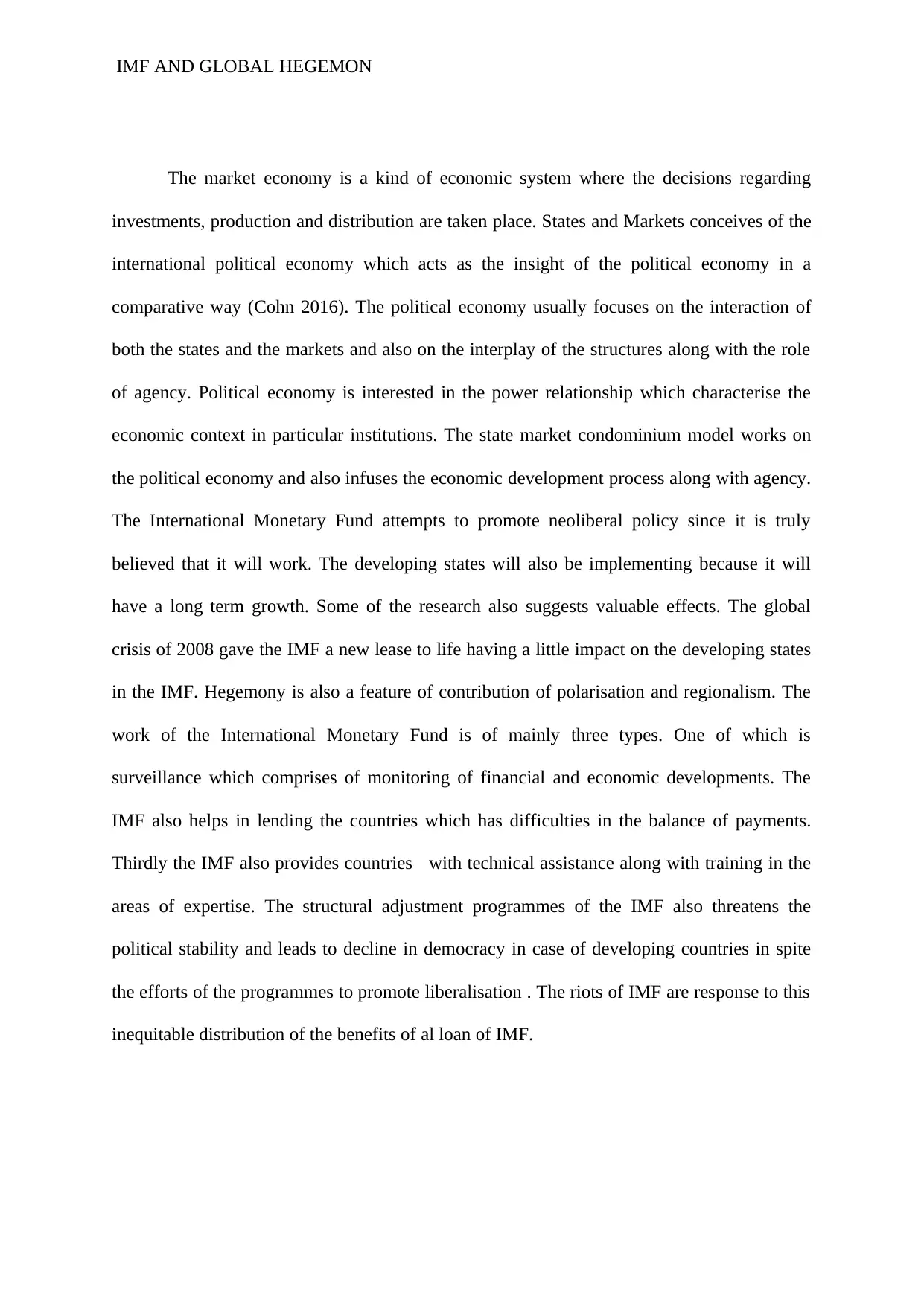
IMF AND GLOBAL HEGEMON
The market economy is a kind of economic system where the decisions regarding
investments, production and distribution are taken place. States and Markets conceives of the
international political economy which acts as the insight of the political economy in a
comparative way (Cohn 2016). The political economy usually focuses on the interaction of
both the states and the markets and also on the interplay of the structures along with the role
of agency. Political economy is interested in the power relationship which characterise the
economic context in particular institutions. The state market condominium model works on
the political economy and also infuses the economic development process along with agency.
The International Monetary Fund attempts to promote neoliberal policy since it is truly
believed that it will work. The developing states will also be implementing because it will
have a long term growth. Some of the research also suggests valuable effects. The global
crisis of 2008 gave the IMF a new lease to life having a little impact on the developing states
in the IMF. Hegemony is also a feature of contribution of polarisation and regionalism. The
work of the International Monetary Fund is of mainly three types. One of which is
surveillance which comprises of monitoring of financial and economic developments. The
IMF also helps in lending the countries which has difficulties in the balance of payments.
Thirdly the IMF also provides countries with technical assistance along with training in the
areas of expertise. The structural adjustment programmes of the IMF also threatens the
political stability and leads to decline in democracy in case of developing countries in spite
the efforts of the programmes to promote liberalisation . The riots of IMF are response to this
inequitable distribution of the benefits of al loan of IMF.
The market economy is a kind of economic system where the decisions regarding
investments, production and distribution are taken place. States and Markets conceives of the
international political economy which acts as the insight of the political economy in a
comparative way (Cohn 2016). The political economy usually focuses on the interaction of
both the states and the markets and also on the interplay of the structures along with the role
of agency. Political economy is interested in the power relationship which characterise the
economic context in particular institutions. The state market condominium model works on
the political economy and also infuses the economic development process along with agency.
The International Monetary Fund attempts to promote neoliberal policy since it is truly
believed that it will work. The developing states will also be implementing because it will
have a long term growth. Some of the research also suggests valuable effects. The global
crisis of 2008 gave the IMF a new lease to life having a little impact on the developing states
in the IMF. Hegemony is also a feature of contribution of polarisation and regionalism. The
work of the International Monetary Fund is of mainly three types. One of which is
surveillance which comprises of monitoring of financial and economic developments. The
IMF also helps in lending the countries which has difficulties in the balance of payments.
Thirdly the IMF also provides countries with technical assistance along with training in the
areas of expertise. The structural adjustment programmes of the IMF also threatens the
political stability and leads to decline in democracy in case of developing countries in spite
the efforts of the programmes to promote liberalisation . The riots of IMF are response to this
inequitable distribution of the benefits of al loan of IMF.
Paraphrase This Document
Need a fresh take? Get an instant paraphrase of this document with our AI Paraphraser
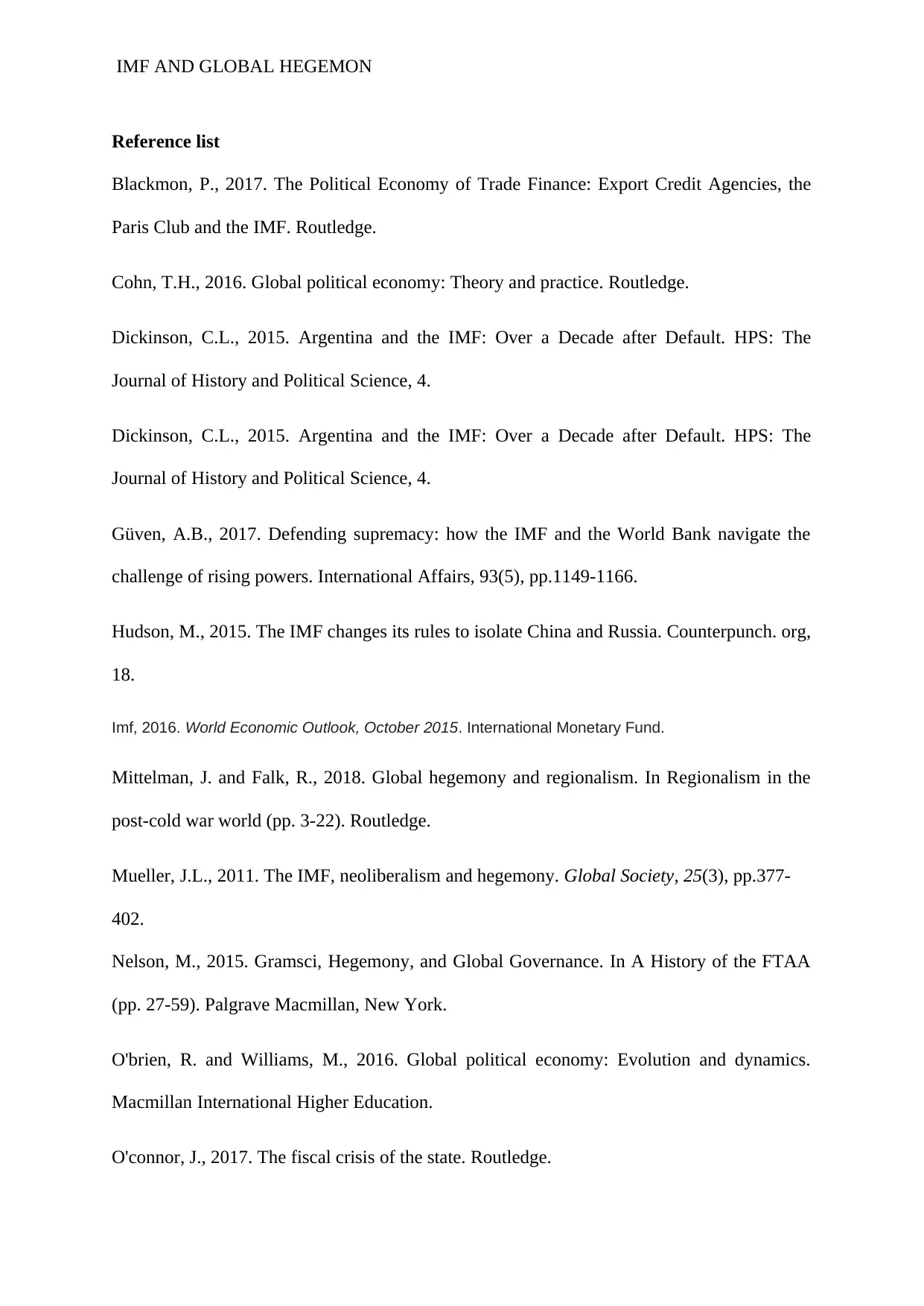
IMF AND GLOBAL HEGEMON
Reference list
Blackmon, P., 2017. The Political Economy of Trade Finance: Export Credit Agencies, the
Paris Club and the IMF. Routledge.
Cohn, T.H., 2016. Global political economy: Theory and practice. Routledge.
Dickinson, C.L., 2015. Argentina and the IMF: Over a Decade after Default. HPS: The
Journal of History and Political Science, 4.
Dickinson, C.L., 2015. Argentina and the IMF: Over a Decade after Default. HPS: The
Journal of History and Political Science, 4.
Güven, A.B., 2017. Defending supremacy: how the IMF and the World Bank navigate the
challenge of rising powers. International Affairs, 93(5), pp.1149-1166.
Hudson, M., 2015. The IMF changes its rules to isolate China and Russia. Counterpunch. org,
18.
Imf, 2016. World Economic Outlook, October 2015. International Monetary Fund.
Mittelman, J. and Falk, R., 2018. Global hegemony and regionalism. In Regionalism in the
post-cold war world (pp. 3-22). Routledge.
Mueller, J.L., 2011. The IMF, neoliberalism and hegemony. Global Society, 25(3), pp.377-
402.
Nelson, M., 2015. Gramsci, Hegemony, and Global Governance. In A History of the FTAA
(pp. 27-59). Palgrave Macmillan, New York.
O'brien, R. and Williams, M., 2016. Global political economy: Evolution and dynamics.
Macmillan International Higher Education.
O'connor, J., 2017. The fiscal crisis of the state. Routledge.
Reference list
Blackmon, P., 2017. The Political Economy of Trade Finance: Export Credit Agencies, the
Paris Club and the IMF. Routledge.
Cohn, T.H., 2016. Global political economy: Theory and practice. Routledge.
Dickinson, C.L., 2015. Argentina and the IMF: Over a Decade after Default. HPS: The
Journal of History and Political Science, 4.
Dickinson, C.L., 2015. Argentina and the IMF: Over a Decade after Default. HPS: The
Journal of History and Political Science, 4.
Güven, A.B., 2017. Defending supremacy: how the IMF and the World Bank navigate the
challenge of rising powers. International Affairs, 93(5), pp.1149-1166.
Hudson, M., 2015. The IMF changes its rules to isolate China and Russia. Counterpunch. org,
18.
Imf, 2016. World Economic Outlook, October 2015. International Monetary Fund.
Mittelman, J. and Falk, R., 2018. Global hegemony and regionalism. In Regionalism in the
post-cold war world (pp. 3-22). Routledge.
Mueller, J.L., 2011. The IMF, neoliberalism and hegemony. Global Society, 25(3), pp.377-
402.
Nelson, M., 2015. Gramsci, Hegemony, and Global Governance. In A History of the FTAA
(pp. 27-59). Palgrave Macmillan, New York.
O'brien, R. and Williams, M., 2016. Global political economy: Evolution and dynamics.
Macmillan International Higher Education.
O'connor, J., 2017. The fiscal crisis of the state. Routledge.
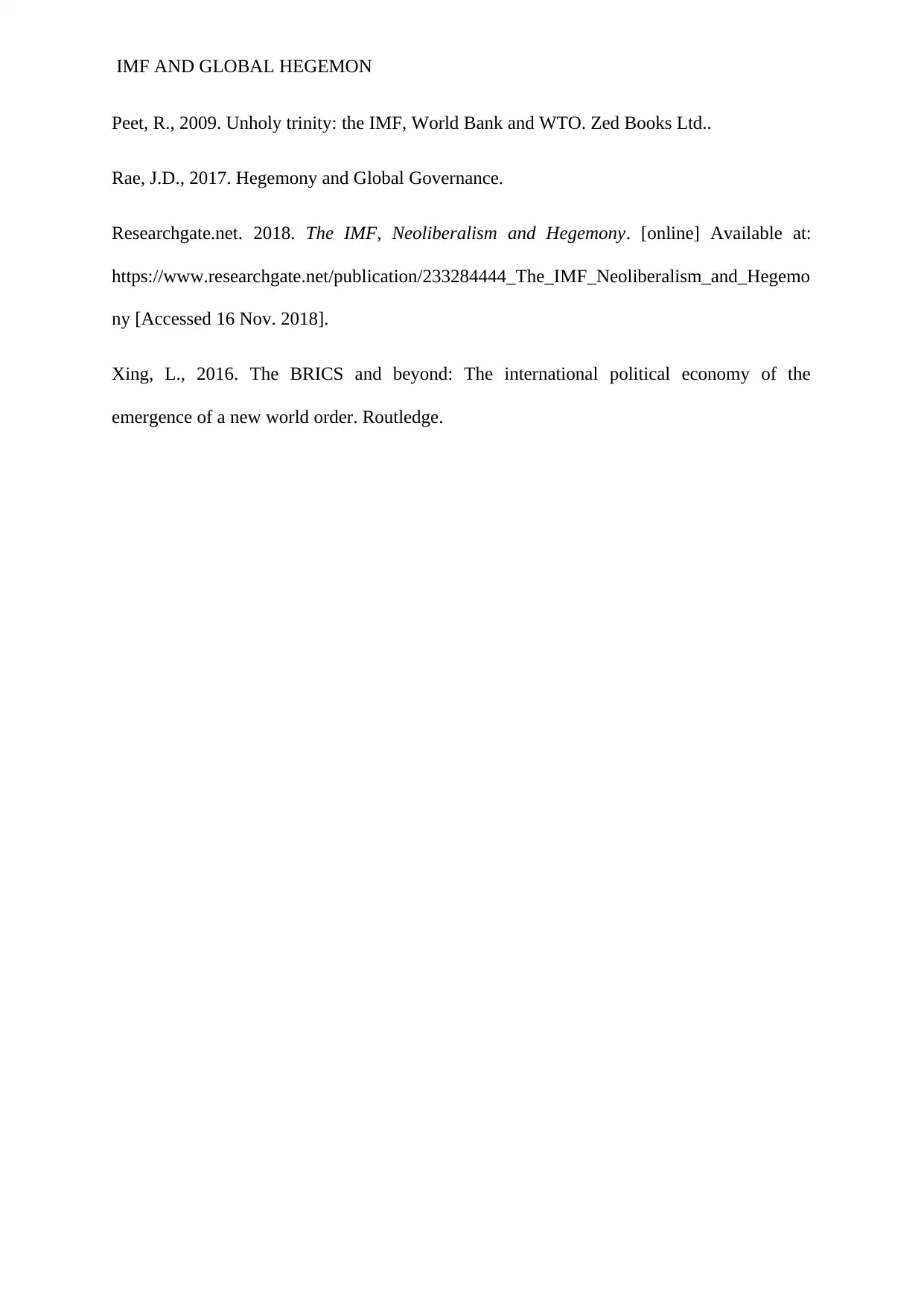
IMF AND GLOBAL HEGEMON
Peet, R., 2009. Unholy trinity: the IMF, World Bank and WTO. Zed Books Ltd..
Rae, J.D., 2017. Hegemony and Global Governance.
Researchgate.net. 2018. The IMF, Neoliberalism and Hegemony. [online] Available at:
https://www.researchgate.net/publication/233284444_The_IMF_Neoliberalism_and_Hegemo
ny [Accessed 16 Nov. 2018].
Xing, L., 2016. The BRICS and beyond: The international political economy of the
emergence of a new world order. Routledge.
Peet, R., 2009. Unholy trinity: the IMF, World Bank and WTO. Zed Books Ltd..
Rae, J.D., 2017. Hegemony and Global Governance.
Researchgate.net. 2018. The IMF, Neoliberalism and Hegemony. [online] Available at:
https://www.researchgate.net/publication/233284444_The_IMF_Neoliberalism_and_Hegemo
ny [Accessed 16 Nov. 2018].
Xing, L., 2016. The BRICS and beyond: The international political economy of the
emergence of a new world order. Routledge.
⊘ This is a preview!⊘
Do you want full access?
Subscribe today to unlock all pages.

Trusted by 1+ million students worldwide
1 out of 9
Related Documents
Your All-in-One AI-Powered Toolkit for Academic Success.
+13062052269
info@desklib.com
Available 24*7 on WhatsApp / Email
![[object Object]](/_next/static/media/star-bottom.7253800d.svg)
Unlock your academic potential
Copyright © 2020–2026 A2Z Services. All Rights Reserved. Developed and managed by ZUCOL.





